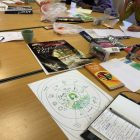Thinking about ‘expertise’.
This post is by Brendan Stone, one of the Trustees for Recovery Enterprises.
I’ve been thinking a lot recently about ‘expertise’. What is it that makes someone an expert, and how can we support, nurture and harness expertise to facilitate and enact meaningful and positive change, especially for people who are experiencing significant disadvantage and exclusion?
One of the founding principles of Recovery Enterprises is that individuals who have experience of mental health problems and of using mental health services have a great deal of expertise – both in our own lives, needs, and potential, as well as in the ways in which services need to evolve to better support people build fulfilling lives.
We need to understand the transformative potential of this idea – an idea which can feel rather neutralised when it is translated into terms such as ‘service-user involvement’. We certainly need to be extremely wary of approaches in which ‘involvement’ entails cursory consultation band little else. The concept that profound expertise is located within a community who have traditionally been defined by what we ‘lack’ – by deficit and difficulty – entails a paradigm shift, in which those who have hitherto been seen as passive recipients are understood as representing the greatest asset and resource for positive societal and institutional change.
One of the interesting things about such a shift in how we think about mental health, and about mental health services, is that as well as offering an exciting and radical means to facilitate more precisely focused services which align with the actual needs and potential of ‘service-users’, it also perhaps unsettles one of the key hindrances to wellbeing: the sense in those of us who live with mental health problems that we have no value.
In practical terms, such a transformation is a complex and ongoing task for large mental health trusts. In some ways perhaps the greatest challenge is the change to institutional culture which it involves, and a concomitant sense of established professional identities being threatened by the recognition of new forms of expertise.
However, trusts might take heart from work in other sectors, for instance in the area of my work: Higher Education. Universities are not (or should not) be an extension of secondary school. For those of who teach in HE, our job is to support undergraduates to make the journey during their time with us from thinking of themselves as being passive recipients of knowledge to an identity as independent learners and scholars, who have confidence in their ability to construct, critique, and develop knowledge. It is a privilege accompanying a student on that journey – indeed it is one of the reasons why teaching in a university is a great job to have. Moreover, universities rely heavily on the expertise of students to help us in core areas of business: from developing teaching and learning strategy, to policy on green impact, and public engagement. I’ve worked with many students over the years on key initiatives, and there is no doubt in my mind that these would have been much less successful if students hadn’t been intrinsically involved.
Writing about social services in the Guardian in August 2015, Professor Peter Beresford insisted that: “Every statutory, voluntary and private social services organisation should be making it possible for service users to speak for themselves and listen to what they say.” Exactly the same imperative applies to mental health services of all kinds. This is certainly an ethical imperative – a matter of social justice – but it also makes good sense for mental health services. Why would you ignore a rich source of knowledge and insight if you want your organisation to thrive?


